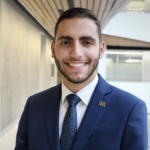By: Chris Oshana, former Youth Advisory Council Member
Chris Oshana is a senior at the University of Michigan studying Biopsychology, Cognition, and Neuroscience, with a minor in Social Class and Inequality Studies. He hopes to inspire other youth to advocate for themselves in all aspects of their lives.
For the past three and a half years of my undergraduate education, I’ve worked non-stop towards one goal: to be accepted into dental school. I took this time to strengthen my application and ensure that dentistry was the field in which I wanted to build a career.
I spent countless nights studying for exams in difficult pre-health classes, courses that were intentionally made harder to “weed out” students who “weren’t fit” to become doctors. There were many moments when I felt like giving up, but I had to remember my end goal. I spent many of my evenings in student organization meetings, some of which I attended, others of which I was running due to leadership roles in multiple clubs on campus. Classes, clubs, attending office hours to make connections with professors, volunteer service work, a dental research job, and spending time with other community-based organizations all helped to strengthen my application and taught me valuable lessons about empathy, communication, and kindness. I ensured I had all my ducks in a row, so by the time my application cycle came around, I was ready. Thankfully, it paid off, and I’ve been accepted to the dental schools of my dreams. And now, as I reflect on this path, I’m beginning to look at what’s next. After my four years of dental school, where will I begin my career?
Admittedly, I hadn’t thought much about this until recently. For the past three and a half years, being “pre-dental” meant doing everything possible to get into dental school. Now that I’m accepted, I’ve taken a moment to relish in my accomplishment and then think about what’s next. Will I go right into private practice general dentistry, or do I want to specialize? Do I want to teach part-time at a dental school? Will I become involved in dental research as a practitioner? What kinds of patients do I want to treat? Should I get involved in corporate dentistry? The answer to almost all of these questions is the same: I don’t know yet. However, for one of these questions, I know the answer; I hope to treat patients who are dentally underserved.
Having spent a considerable amount of my time working with youth healthcare advocacy organizations over the last six years, I’ve learned just how important advocating for the marginalized can be. In my work at the Adolescent Health Initiative, I helped oversee the approval of youth-friendly materials distributed to healthcare providers across the country. These materials help providers center the wants and needs of youth patients in their practice, making the space more welcoming and inclusive. Here, I saw how valuable speaking up for young people is because we’re often marginalized when it comes to making our own healthcare decisions. I learned the importance of helping marginalized populations through this work, and I carry that value with me.
At the School-Based Health Alliance, I’ve had the opportunity to learn about how vital SBHCs are for communities in need. Understanding the importance of FQHCs/SBHCs has allowed me to realize that I want to help treat underserved patients. As a dental healthcare professional, I will have the ability to do this.
Through the Health Resources and Services Administration, I learned about Health Professional Shortage Areas or HPSAs. HPSAs are areas in dire need of more healthcare professionals to treat vulnerable populations. Seeing as I want to become a dentist, I took the time to research dental HPSAs, which can be anywhere from rural midwestern farm towns to the Bronx to Native American reservations across the country. Dental HPSAs are searching for licensed dentists and hygienists to staff their clinics, treat their patients, and provide for the communities. Upon learning that this opportunity was available, I felt like I had just read my dream job description. It’s unfortunate that anyone is underserved in their dental health care needs. However, the ability to have community-based programs in SBHCs and FQHCs allows providers to treat the most vulnerable populations in a respectful and dignified manner and not as a charity case. In this way, I hope to build trust with my patients, helping them trust the healthcare system and encouraging them to take charge of their oral health.
My experience as a Youth Advisory Council member for the School-Based Health Alliance has shown me just how important FQHCs and SBHCs can be in the lives of children and families across the country. When we think of cases like Deamonte Driver, a child who died from an untreated toothache because his family couldn’t access affordable dental care, we can understand how important dental health is in children and the importance of having a dentist in SBHC environments. As I finally enter dental school and learn the information I will use for the rest of my career, I hope to become a dentist who treats patients in unfortunate situations like these.

